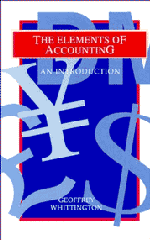Book contents
- Frontmatter
- Contents
- Preface
- 1 Basic concepts
- 2 The accounting framework
- 3 The accounting system: elements of double entry accounting
- 4 The accounting system: revenues and expenses
- 5 The accounting system: accruals, prepayments and depreciation
- 6 The interpretation of accounts
- 7 Accounting for price changes
- 8 The collection and processing of accounting data
- 9 Some extensions and suggestions for further reading
- Solutions to exercises
- Notes
- Index
9 - Some extensions and suggestions for further reading
Published online by Cambridge University Press: 01 June 2011
- Frontmatter
- Contents
- Preface
- 1 Basic concepts
- 2 The accounting framework
- 3 The accounting system: elements of double entry accounting
- 4 The accounting system: revenues and expenses
- 5 The accounting system: accruals, prepayments and depreciation
- 6 The interpretation of accounts
- 7 Accounting for price changes
- 8 The collection and processing of accounting data
- 9 Some extensions and suggestions for further reading
- Solutions to exercises
- Notes
- Index
Summary
INTRODUCTION
In this final chapter, we touch upon some important areas which have not been dealt with at all so far and whose proper treatment is beyond the modest aims of this book. We set out to explore what was described as the ‘hard core’ of the accounting framework. We did not intend to explore the wide range of applications of accounting which exists in the real world, or the wide variety of accounting research. However, this book would be incomplete without the briefest of allusions to other aspects of accounting. In particular, we have not referred to corporate financial reporting, although it is by far the most important area in which financial accountants operate, and we have not discussed the scope of management accounting. The next two sections give the briefest of introductions to these two areas. Finally, there are suggestions for further reading in these areas and the wider field of accounting.
CORPORATE FINANCIAL REPORTING
Most countries have some form of corporate business enterprise which can be created reasonably simply and cheaply by a registration process authorised by statute. In the UK such bodies are known as companies (incorporated under the Companies Acts) and in the USA they are called corporations. The essence of incorporation is that there is a body corporate, which is a legal person separate from the individual members.
- Type
- Chapter
- Information
- The Elements of AccountingAn Introduction, pp. 136 - 146Publisher: Cambridge University PressPrint publication year: 1992



